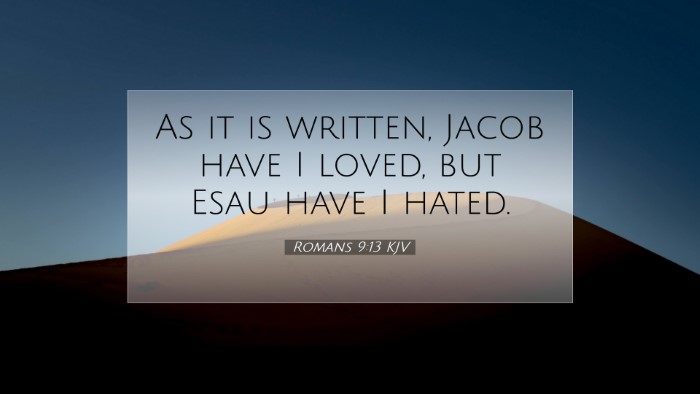Commentary on Romans 9:13
Verse Reference: Romans 9:13 - "As it is written, Jacob have I loved, but Esau have I hated."
Introduction
This verse forms a pivotal part of the Apostle Paul's discourse on divine election and sovereignty. In its context, it conveys profound theological implications regarding God's choices and His relationship with humanity. This commentary synthesizes insights from historic public domain commentaries, offering rich perspectives for pastors, students, theologians, and Bible scholars.
Contextual Background
To fully grasp the meaning of Romans 9:13, it is critical to consider the preceding chapters, particularly Romans 8, where Paul highlights the security of believers and the inevitability of God's purposes for His elect. Romans 9 marks a transition to discussing Israel's place in God's redemptive plan, as well as the sobering truth that not all who are descended from Israel belong to Israel (Romans 9:6).
This verse specifically references Malachi 1:2-3, where God expresses His distinct love for Jacob contrasted with His rejection of Esau, setting a precedent for the unfolding discussion about God's sovereign election.
Theological Implications
Paul's usage of "love" and "hate" should not be interpreted in a strictly emotional or human sense. Matthew Henry explains that this contrast illustrates God’s sovereign choice rather than a literal emotional disposition. "Hate" here is understood as a preference or choosing. God’s selection of Jacob signifies His initiative in redemptive history.
Commentary Insights
-
Matthew Henry:
Henry stresses God's sovereignty in election. He notes that God's terms of love and hatred pertain more to spiritual significance than personal affection. God's choice of Jacob over Esau is part of His eternal plan, illustrating that His purposes are not based on human merit or foreseen faith.
-
Albert Barnes:
Barnes elaborates on the concept of divine sovereignty, indicating that God’s declaration concerning Jacob and Esau emphasizes His authority to choose whom He wills to bless. He asserts that this passage illustrates a doctrine that might offend human sensibilities but is foundational to understanding God's absolute dominion in all matters.
-
Adam Clarke:
Clarke discusses the historical and cultural implications of the choice between Jacob and Esau. He regards the statement as a part of God's intent to exemplify His overarching plans through the lineage of Jacob. Clarke’s insights underscore the notion of divine purposes being accomplished through individual lives irrespective of worldly standards.
Practical Applications
For today's believers and scholars, Romans 9:13 calls for a humble acknowledgment of God’s sovereignty. It invites an exploration of how His choices shape our understanding of grace. Reflection on this verse can lead to a deeper appreciation of God's mercy toward the elect and an urgency to evangelize those outside the faith, recognizing the staggering implications of election and grace.
Conclusion
Romans 9:13 encapsulates a fundamental principle in the Christian understanding of God’s nature and His interaction with humanity. As we consider the insights from Matthew Henry, Albert Barnes, and Adam Clarke, we are reminded of the need for faith in God’s sovereign choices and His divine plans that surpass human comprehension.


